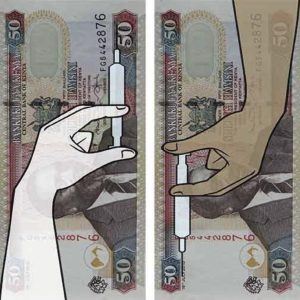Linda Nordling in Undark:
 In February of last year, 64 healthy adult Kenyans checked into a university residence in the coastal town of Kilifi. After a battery of medical tests, they proceeded, one by one, into a room where a doctor injected them with live malaria parasites. Left untreated, the infection could have sickened or even killed them, since malaria claims hundreds of thousands of lives every year.
In February of last year, 64 healthy adult Kenyans checked into a university residence in the coastal town of Kilifi. After a battery of medical tests, they proceeded, one by one, into a room where a doctor injected them with live malaria parasites. Left untreated, the infection could have sickened or even killed them, since malaria claims hundreds of thousands of lives every year.
But the volunteers — among them casual laborers, subsistence farmers, and young mothers from nearby villages — were promised treatment as soon as infection took hold. They spent the next few weeks sleeping, eating, and socializing together under the watchful eye of scientists, giving regular blood samples and undergoing physical exams. Some grew sick within a couple of weeks, and were treated and cleared of the parasite before being sent home. Those who did not fall ill were treated after three weeks as a precaution and discharged, too.
As compensation, the volunteers received between $300 and $480 each, or roughly $20 a day, a rate based on the minimum wage for casual laborers in Kenya and the out-of-pocket allowance set for overnight stays by KEMRI, the Kenya Medical Research Institute.
More here.
